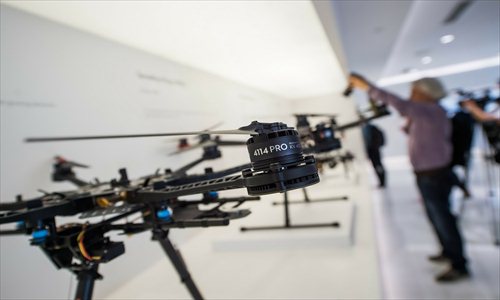DJI executive says R&D spending crucial to high-end manufacturing
Although China's traditional manufacturing sector is struggling, some of the country's high-end manufacturers have been doing considerably better. On a recent trip to the Pearl River Delta (PRD), Global Times reporter Liu Tian (GT)interviewed Wang Fan (Wang), vice president at Shenzhen-based DJI Technology Co, the world's largest maker of consumer drones, or unmanned aerial vehicles (UAVs), to discuss the company's success. The company has taken more than 70 percent of the global consumer drone market, Wang noted. This story is the third in a series of four reports about the PRD.

Unmanned aerial vehicles (UAVs) stand on display on April 20 at Shenzhen-based DJI Technology Co, the world's largest consumer UAV manufacturer. Photo: IC
GT: The international market has long viewed products made in China as "low-end," "cheap" or as "knockoffs." What is the reason for this? And what is DJI's image in the international market?
Wang: There are many reasons for this. First, in China, where labor costs have been lower than in many other countries, manufacturers have been reluctant to invest time and money in research and development (R&D).
Instead, they've been more willing to manufacture small, low-added value products with a low barrier to entry and relatively high profit margin.
Second, there is a clear impetuous atmosphere in the Chinese society. This is not conducive to innovation, which requires a lot of time and patience.
Third, there is still insufficient patent protection in China. The situation has frustrated innovators who have spent a lot on research. They have to worry about others copying their work.
DJI has an internationalized image. That's because we want to impress our customers to earn the trust of the mainstream media and international consumers.
When consumers learn that DJI products are from China, they will begin to value Made-in-China products.
GT: What are the applications for DJI's UAVs?
Wang: First, the DJI UAVs can be used in mid- to high-end filmmaking because it can significantly reduce the cost of taking aerial photographs.
Second, it can also be widely used in agriculture, such as for spraying pesticide.
Third, it can be used in security, such as for on-site inspection of power plants.
The DJI UAVs can be used in many more areas, because we now are doing UAV+, to get more industries to use the UAV. We expect this will produce a "multiplier effect."
GT: Why has DJI, rather than the world's largest aircraft manufacturing enterprises, taken the lead in the UAV market?
Wang: Although both airplanes and UAVs can fly, they have completely different technologies. The industries are completely different. Airplanes have fixed wings. Their job is to carry people, cargo or weapons. UAVs have multiple rotors and carry no passengers. As of now, no world-class aircraft manufacturing enterprise has entered the UAV industry.
GT: In DJI's view, what is a perfect UAV?
Wang: It should be more stable, secure and intelligent. Stability means that consumers can keep the UAV under control under any circumstances, such as bad weather, high altitude or electromagnetic interference. Security means the UAV will not accidentally fall out of the sky, or if it does, it won't injure any one. Intelligence means that the UAV can do more things that only human could do in the past.
GT: How does DJI maintain its competitiveness as more and more competitors enter the industry?
Wang: DJI's advantage lies in the industry's high technological barriers to entry.
DJI has about 5,000 employees all around the world, including 1,500 R&D personnel. Our R&D team is larger than the total staff of any single UAV enterprise in the world.
GT: How does DJI view the potential negative uses of UAVs, such as transporting mobile phones, weapons or illegal drugs into prisons, according to foreign media reports?
Wang: Technology is innocent. As an UAV enterprise, DJI perfectly combines the flight and filming functions. We have tried our best to improve the technology day-by-day.
As for the security and ethical issues of UAVs, they should be faced by the whole society, and these problems exist in all industries.
DJI has taken some measures to deal with these problems. First, DJI has included fly safe guide sheets in the product's packaging, in an attempt to educate our customers so they fly safely and responsibly.
Second, DJI has installed technology to prevent UAVs from entering no-fly zones. For example, with built-in software, DJI can ensure its UAV products cannot fly into most of the world's civilian airports.
GT: How does DJI manage its relationship with the capital market? And what is DJI's next move in the capital market?
Wang: Although it is viewed as a unicorn, DJI is keeping a certain distance from the capital markets, and DJI has relatively strong negotiating power with investors.
The company got a new round of financing last year with a valuation of about $10 billion.
DJI has no plans to seek more financing over the next one or two years. Neither does the company plan to get listed in the next five years. DJI has a healthy cash flow from its products.
Newspaper headline: Flying to the top of the market